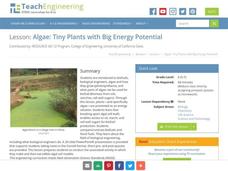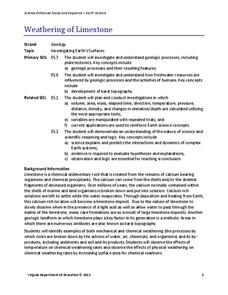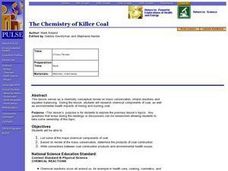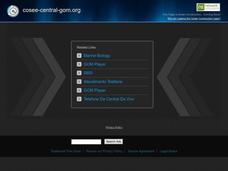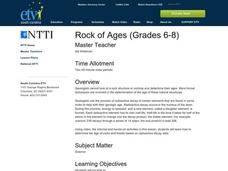Curated OER
The Mesozoic Era Crossword Puzzle
In this Mesozoic Era crossword puzzle worksheet, students examine the 12 clues in order to complete the puzzle with the words and names from this time period.
San Francisco Public Utilities Commission
What is Drought? No Rain, No Water
How can climate change affect our water supply? Have kids read a passage about the water cycle and water conservation, which includes six questions that challenge them to use context clues.
Howard Hughes Medical Institute
Explore Your Inner Animals
Human bodies prove evolution thanks to our genes, bones, and more. Learning about specific body parts and how they evolved from other species helps individuals better understand the transition species that helped us become who we are today.
Teach Engineering
Algae: Tiny Plants with Big Energy Potential
My, what big energy potential you have! Scholars learn about the energy potential of using algae as a biofuel. A PowerPoint presentation first describes the structure of algae and then how researchers use algae as biofuel to produce energy.
Chicago Botanic Garden
Historical Climate Cycles
Ice core samples give scientists access to climates of old—those from more than 800,000 years ago. Through an analysis of various temperature graphs from ice cores, tree rings, and weather stations, scholars compare historical climates...
Illustrative Mathematics
Accuracy of Carbon 14 Dating II
The scientific issue of carbon-14 dating and exponential decay gets a statistics-based treatment in this problem. The class starts with a basic investigation of carbon content, but then branches out to questions of accuracy and ranges of...
National Park Service
What Can We Do?
Motivate young conservationists to stand up and make a change. After learning about the efforts in Cascade Nation Park to reduce carbon emissions in order to preserve the wilderness, students work in groups creating action plans for...
California Academy of Science
Natural Resources Bingo
Bingo isn't just a silly game, it's a great way to practice all types of skills. After reviewing that the earth is composed of natural resources, what those natural resources are, and sustainability, the class plays a game of bingo. The...
Global Oneness Project
Deconstructing Consumerism
A short, engaging video provides a critique of the hyper-consumerist mentality that many think have taken over the Western world. After watching the video, pupils reflect on their own habits and use evidence to respond to discussion and...
Virginia Department of Education
Weathering of Limestone
We all know limestone weathers, but what affects the rate of weathering? Young scientists investigate the physical and chemical weathering of limestone (chalk) through experimentation. First, they conduct trials with different-size...
Curated OER
Evolution
In this evolution worksheet, students review genetic variability, gene mutations, biodiversity and adaptations. This worksheet has 22 fill in the blank and 10 short answer questions.
Curated OER
Dino Detectives
As students examine maps of Utah, 4th graders search for clues about what prehistoric life was like in Utah.
Curated OER
The Chemistry of Killer Coal
Students research chemical components of coal, as well as environmental health impacts of mining and burning coal. They discuss conservation of mass as it relates to combustion of organic compounds.
Curated OER
The Greenhouse Effect
Students complete a group experiment which simulates the greenhouse effect as well as compare the climate on Earth to the climate on Venus following a class discussion on the greenhouse effect.
Curated OER
Mapping Dinosaurs in Place and Time
Third graders study the continents that specific dinosaurs lived on. They compare the continent's location and climate when dinosaurs live there with its current location.
Curated OER
Missouri Time Scale
Learners plot events that happened years ago beginning with volcano activity. In this investigative lesson students are introduced to the different eras and plot them on a map.
Curated OER
Fossils-Where Should We Place Archaeopteryx?
Students explore an interactive computer activity that provides the opportunity to look at features of various groups of animals and determine where an extinct organism might be classified.
Curated OER
Combustion Reactions
Students write a balanced chemical reaction. They articulate how burning fossil fuels increase the carbon dioxide levels in the atmosphere. Students incorporate all the environmental risks involved as well.
Curated OER
Rock of Ages
Students use a video, the Internet and hands-on activities to explore how to determine the age of rocks and fossils based on radioactive decay data.
Curated OER
The Moving Continents from Pangaea to the Future
Eighth graders examine how the movements of the Earth contribute to fossil distribution. In this fossils instructional activity students make maps of the placement of the continents.
Curated OER
Hominoid Cranium Comparison
Students describe, measure and compare cranial casts from contemporary apes (chimpanzees and gorillas, typically), modern humans and fossil "hominids" (erect and bipedal forms evolutionarily separated from apes).
Curated OER
Who Was Here First? Relative Dating
Learners read about and complete question activities for the topic of relative dating. In this relative dating lesson, students read information for the topic and then complete two activities to further their understanding of geologic...
Curated OER
GeoHunt
Students describe the difference between geological resources and othe natural resources. They list the rocks, minerals, and fossil fuels that are found in Illinois and their uses. They identify ways to conserve natural resources.
Curated OER
What Big Teeth You Have:
Students make their own tooth impressions of a sharp and a flat tooth and compare the differences. They make impression of fossil teeth from dinosaurs comparing the sharp and flat teeth and learning about their uses.
Other popular searches
- Geologic Time and Fossils
- Index Fossils Geologic Time
- Time Lines Fossils
- Fossils and Time Worksheets
- Geologic Time & Fossils Lab
- Fossils Geological Time Line





